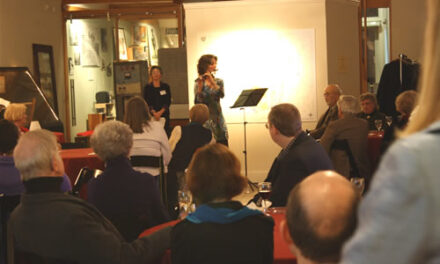Greater Love — The English Choral and Organ Tradition. East Carolina University Chamber Singers, Daniel Bara, director, with Janette Fishell, organ. Gothic G-49256; © 2007; 72:17; $15.98.
Greater Love is the kind of recording that does not grow old with repeated listening. In fact, one discovers new moments of pleasure just about every time it plays. Dr. Daniel Bara, director of choral music activities at East Carolina University and director of the ensemble since 2001, leads the university music program’s most skilled choral group through more than 20 selections. The CD contains no Tallis or Byrd or Farrant; most selections are drawn from 20th century English choral music, though one piece is by 19th century composer Robert Pearsall and another is by Romantic composer John Ireland.
The ECU Chamber Singers consist of nearly 40 undergraduate and graduate students whose vocal maturity is impressive indeed. They handle a cappella singing flawlessly, including many instances of tricky suspensions, and they neither oversing on forte passages nor fade into tunelessness on the softest, quietest sections. The repertoire on the recording provides several opportunities for vocal missteps, yet they perform with great skill and precision from start to finish.
The singing on Greater Love is not simple four-part harmonies. On Pearsall’s “Tu es Petrus,” for example, the singers negotiate the loveliest of eight-part layered lines. In Michael Tippett’s “Five Negro Spirituals,” the singers apply a straightforward approach to the music, whether the score calls for multiple parts or unison or octaves.
Nearly a dozen singers shine in solo passages. Soprano Alyssa Howell, for instance, soars in the spirituals, not in a brassy, up-front way, but in a floating way, suspended over a rich chorus, and tenor Aaron Carlyle and bass Gary Harwell have splendid lines in the spirituals as well. Tenor Matt Hill and bass-baritone Jeremy Jones are heard to wonderful effect in Herbert Howells’ “Psalm 23” and “Psalm 121.” Soprano Liz Bean handles one tricky solo section of Benjamin Britten’s “Rejoice in the Lamb” well, as does tenor Anthony Maglione on another solo section.
The highlight of the recording might well be the Britten piece; it certainly imposes a wide variety of demands on the singers, without taxing the listener. Shifting rhythms, odd melody lines, some modern harmonies (not dissonant, perhaps unexpected: listen closely to the line “and the devils themselves are at peace,” followed by the cascading “Halleluiah”) — all are present, yet the singers seem to fashion a near-seamless performance that causes one to say, simply, “Wow!”
Other listeners will say Ireland’s “Greater Love Hath No Man” is the recording’s highlight. This is a gorgeous piece, featuring fine solo lines by alto Deborah Nansteel and bass-baritone Jeremy Jones. The tenors lead into the piece, followed by the full choir in parts and then unison passages. The full choral portions are thrilling — “Ye are wash’d, ye are sanctified” sends chills — and Janette Fishell’s organ line reaches a wonderful climax before tapering off to a subtle cushion for the closing choral section. (She also opens the recording with Howells’ stirring Psalm Prelude Set 2, No. 3, and she accompanies nicely Britten’s “Rejoice in the Lamb.”)
Still others will choose the closing selection, “Marianne,” a folk song arranged by Philip Wilby, as the focal point of the entire recording. Bara brings all the strengths of this marvelous choral ensemble to bear on a luminous a cappella reading. The third verse in particular is achingly beautiful, with a firm bass foundation balancing well against the soprano and tenor sections.
The only shortcoming is an occasional instance in which the singers are slightly above center on their pitches. (Of course, choral directors urge singers, if they have to err, to sing sharp rather than flat.) This is most noticeable on the final note of “Go Down, Moses.” But this is a minor quibble.
Prospective listeners should not be under the misimpression that this is an effort by some college glee club. These young folks bring a maturity and skill level to the material that is not often found in singers of this age. The Gothic label also boasts the Dale Warland Singers, Trinity Church (Boston) and the Cathedral Choral Society from the National Cathedral, among others, and the ECU Chamber Singers fit in splendidly. If you have not heard this ensemble in person, this well-executed recording will introduce you to a musical treasure from eastern North Carolina.











